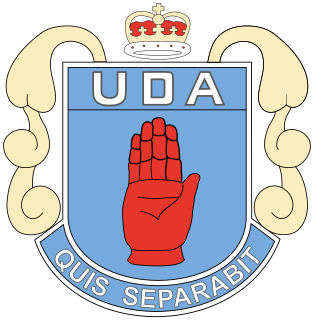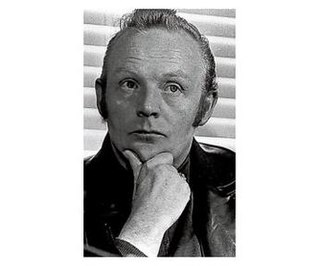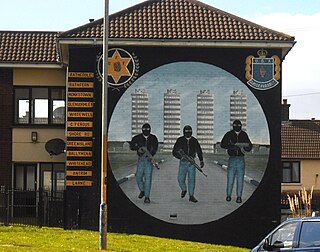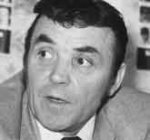Related Research Articles

The Ulster Defence Association (UDA) is an Ulster loyalist paramilitary group in Northern Ireland. It was formed in September 1971 as an umbrella group for various loyalist groups and undertook an armed campaign of almost twenty-four years as one of the participants of the Troubles. Its declared goal was to defend Ulster Protestant loyalist areas and to combat Irish republicanism, particularly the Provisional Irish Republican Army (IRA). In the 1970s, uniformed UDA members openly patrolled these areas armed with batons and held large marches and rallies. Within the UDA was a group tasked with launching paramilitary attacks; it used the cover name Ulster Freedom Fighters (UFF) so that the UDA would not be outlawed. The British government outlawed the UFF in November 1973, but the UDA itself was not proscribed as a terrorist group until August 1992.
A loyalist feud refers to any of the sporadic feuds which have erupted almost routinely between Northern Ireland's various loyalist paramilitary groups during and after the ethno-political conflict known as the Troubles broke out in 1969. The feuds have frequently involved problems between and within the Ulster Defence Association (UDA) and the Ulster Volunteer Force (UVF) as well as, later, the Loyalist Volunteer Force (LVF).

John "Big John" McMichael was a leading Northern Ireland loyalist who rose to become the most prominent and charismatic figure within the Ulster Defence Association (UDA) as the Deputy Commander and leader of its South Belfast Brigade. He was also commander of the organisation's cover name, the "Ulster Freedom Fighters" (UFF), overseeing an assassination campaign against prominent republican figures whose details were included in a notorious "shopping list" derived from leaked security forces documents. The UDA used the UFF name when it wished to claim responsibility for attacks, thus allowing it to remain a legal paramilitary organisation until August 1992 when it was proscribed by the British Government.

Tommy Herron was a loyalist from Northern Ireland, and a leading member of the Ulster Defence Association (UDA) until his death in a fatal shooting. Herron controlled the UDA in East Belfast, one of its two earliest strongholds. From 1972, he was the organisation's vice-chairman and most prominent spokesperson, and was the first person to receive a salary from the UDA.
Andrew Tyrie is an Ulster loyalist paramilitary leader who served as commander of the Ulster Defence Association (UDA) during much of its early history. He took the place of Tommy Herron in 1973 when the latter was killed, and led the organisation until March 1988 when an attempt on his life forced him to resign from his command.
Charles Harding Smith was a loyalist leader in Northern Ireland and the first effective leader of the Ulster Defence Association (UDA). An important figure in the Belfast-based "defence associations" that formed the basis of the UDA on its formation in 1971, Smith later became embroiled in feuds with other UDA leaders and was eventually driven out of Northern Ireland by his opponents.

The UDA South East Antrim Brigade was previously one of the six brigades of the Ulster Defence Association (UDA) and are heavily involved in the drug trade. It is claimed they control "100%" of an illegal drugs network in south-east Antrim, Northern Ireland. A mural in support of the group lists its areas of activity as being Rathcoole, Rathfern, Monkstown, Glengormley and Whitewell, all of which are part of Newtownabbey, as well as Carrickfergus, the Shore Road, Greenisland, Ballymena, Whitehead, Antrim and Larne. A newer mural in the Cloughfern area of Newtownabbey and flags have updated the areas to include Ballycarry, Ballyclare, the rural hinterland of Ballymena called 'Braidside' and despite not being in County Antrim, the town of Newtownards. The Guardian has identified it as "one of the most dangerous factions". The Irish News described the brigade as 'powerful' and at one time being 'the most bloody and murderous gang operating within the paramilitary organisation'. Since 2007 the South East Antrim Brigade has operated independently of the UDA following a fall-out.
H. David "Davy" Payne was a senior Northern Irish loyalist and a high-ranking member of the Ulster Defence Association (UDA) during the Troubles, serving as brigadier of the North Belfast Brigade. He was first in command of the Shankill Road brigade of the Ulster Freedom Fighters (UFF), which was the "cover name" of the militant branch of the UDA. The group was responsible for a series of abductions and killings of mostly Catholic civilians in the early 1970s.

Tommy "Tucker" Lyttle, was a high-ranking Ulster loyalist during the period of religious-political conflict in Northern Ireland known as "the Troubles". A member of the Ulster Defence Association (UDA) – the largest loyalist paramilitary organisation in Northern Ireland – he first held the rank of lieutenant colonel and later was made a brigadier. He served as the UDA's spokesman as well as the leader of the organisation's West Belfast Brigade from 1975 until his arrest and imprisonment in 1990. According to journalists Henry McDonald and Brian Rowan, and the Pat Finucane Centre, he became a Royal Ulster Constabulary (RUC) Special Branch informer.
Alex Kerr was a Northern Irish former loyalist paramilitary. Kerr was a brigadier in the Ulster Defence Association (UDA)'s South Belfast Brigade before becoming one of the two founders of the Loyalist Volunteer Force (LVF). He is no longer active in loyalism.
Joe English is a former Ulster loyalist activist. English was a leading figure in both the Ulster Defence Association (UDA) and the Ulster Democratic Party (UDP) and was instrumental in the early stages of the Northern Ireland peace process. He is a native of the Rathcoole area of Newtownabbey, Northern Ireland. English is a member of the Apprentice Boys of Derry.
Edward "Ned" McCreery was a Northern Irish loyalist. A leading member of the Ulster Defence Association (UDA), he was notorious for the use of torture in his killings. He was leader of the UDA East Belfast Brigade for several years at a time when the brigade was at its most active. He later fell out of favour with other high-ranking UDA figures and was killed by unidentified members of the organisation.
David "Davy" Fogel, also known as "Big Dave", was a former loyalist and a leading member of the loyalist vigilante Woodvale Defence Association (WDA) which later merged with other groups becoming the Ulster Defence Association (UDA). Born in London, Fogel was a former British soldier who had served in Northern Ireland before marrying a local Belfast woman and settling down with his family in Woodvale, Belfast.
James "Jimbo" Simpson, also known as the Bacardi Brigadier, was a Northern Irish loyalist paramilitary. He was most noted for his time as Brigadier of the North Belfast Ulster Defence Association (UDA). After falling from grace, Simpson spent a number of years outside Northern Ireland. He returned to Belfast in 2014 in a move related to an ongoing loyalist feud.
Leonard "Jim" James Anderson 27 May 1931 – 27 June 2019) was a loyalist paramilitary leader from Northern Ireland, who from April to December 1972, was the acting leader of the Ulster Defence Association (UDA) while its commander and the founder of the organisation, Charles Harding Smith was in jail on remand for gun-running. Upon the latter's return, Anderson, together with Harding Smith, was joint chairman of the UDA until he stood down in the spring of 1973. In the battle between Harding Smith and East Belfast brigadier, Tommy Herron for the succession to the leadership, a compromise candidate, Andy Tyrie, was appointed as chairman.
William Elliot was a former Northern Irish loyalist who served as brigadier of the Ulster Defence Association's (UDA) East Belfast Brigade in the 1980s.
The UDA West Belfast Brigade is the section of the Ulster loyalist paramilitary group, the Ulster Defence Association (UDA), based in the western quarter of Belfast, in the Greater Shankill area. Initially a battalion, the West Belfast Brigade emerged from the local "defence associations" active in the Shankill at the beginning of the Troubles and became the first section to be officially designated as a separate entity within the wider UDA structure. During the 1970s and 1980s the West Belfast Brigade was involved in a series of killings as well as establishing a significant presence as an outlet for racketeering.
Albert Wallace "Ginger" Baker is an Ulster loyalist who was convicted of four murders carried out by the Ulster Defence Association (UDA), of which he was a leading member. He turned himself in to the police in 1973 after throwing a hand grenade into a bus transporting Catholic workmen in East Belfast, Northern Ireland, which killed one man. He admitted to this killing and those of three other Catholics the previous year, as well as 11 armed robberies. He was sentenced to 25 years imprisonment for the four murders.

William "Bucky" McCullough was a Northern Irish loyalist paramilitary with the Ulster Defence Association (UDA). McCullough was a leading member of the UDA's West Belfast Brigade, holding the rank of Lieutenant-Colonel, until 1981 when he was killed by the republican Irish National Liberation Army (INLA).
Andrew Robinson is a Northern Irish former loyalist paramilitary leader. Robinson held the rank of "Brigadier" in the Ulster Defence Association (UDA) and was leader of the organisation's North Antrim and Londonderry Brigade as well as a member of the UDA's Inner Council.
References
- ↑ Taylor, Peter (1999). Loyalists. London: Bloomsbury Publishing Plc. p.114
- ↑ McDonald, Henry & Cusack, Jim (2004): UDA - Inside the Heart of Loyalist Terror. Dublin: Penguin Ireland. p.68
- ↑ Steve Bruce, The Red Hand, Oxford University Press, 1992, p. 105
- 1 2 McDonald, Henry & Cusack, Jim (2004). UDA - Inside the Heart of Loyalist Terror. Dublin: Penguin Ireland. p.70
- ↑ McDonald & Cusack. UDA. p.123
- ↑ McDonald & Cusack. UDA'. p.124